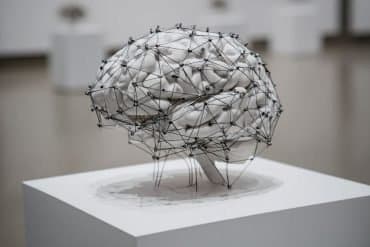Summary: A new study highlights a potential role for immune system dysfunction in the onset and progression of Alzheimer’s disease. Researchers found that neuroinflammation, trained innate immune memory, and cellular reprogramming may interact with amyloid and tau proteins to drive disease pathology.
This suggests that Alzheimer’s may be partly an autoimmune disorder triggered by maladaptive immune responses to internal molecules. The findings offer new insight into how immune-driven inflammation could open pathways for future Alzheimer’s treatments.
Key Facts:
- Immune Role in Alzheimer’s: Neuroinflammation and innate immune memory may initiate and sustain Alzheimer’s progression.
- Beyond Amyloid and Tau: Overactive immune responses to amyloid-beta and tau could be key triggers of disease.
- Therapeutic Potential: Targeting dysfunctional immune mechanisms may offer new approaches for Alzheimer’s treatment.
Source: Temple University
Brain tissue analysis of an animal model reveals the potential role of immune system dysfunction in the onset and progression of Alzheimer’s Disease (AD).
Published April 15, 2025 in the Journal of Alzheimer’s Disease, the new study uses RNA sequencing to demonstrate a link between neuroinflammation, innate immune memory, and cellular plasticity to AD progression.

In combination with the established science about amyloid and tau proteins in Alzheimer’s, increasing evidence implicates glia-driven neuroinflammatory mechanisms as a potential deeper understanding of the causes, and an opportunity to investigate potential treatments for AD.
Emerging research positions AD as an innate autoimmune pathology, driven by maladaptive immune responses to various endogenous “triggering molecules,” such as amyloid-Beta and tau.
This study expands the current literature by evaluating whether epigenetically encoded innate immune memory (trained immunity) and cell trans-differentiation also contribute to the disease cascade.
“This study identifies a novel immunological axis in Alzheimer’s disease,” says Domenico Praticò, MD, the Scott Richards North Star Foundation Chair for Alzheimer’s Research, Professor of Neural Sciences and Founding Director of the Alzheimer’s Center at Temple (ACT), at the Lewis Katz School of Medicine at Temple University (LKSOM).
“The findings emphasize the roles of trained immunity, and inflammation enhancement, which may initiate a sustained cycle of dysfunctional immune responses.
“This overactive immune response then promotes chronic neuroinflammation and cellular reprogramming contributing to the onset and progression of this debilitating disease.”
About this Alzheimer’s disease research news
Author: Domenico Pratico
Source: Temple University
Contact: Domenico Pratico – Temple University
Image: The image is credited to Neuroscience News
Original Research: Closed access.
“Alzheimer’s disease as an auto-innate immune pathology with potential cell trans-differentiation and enhanced trained immunity in 3xTg-AD mouse model” by Domenico Pratico et al. Journal of Alzheimer’s Disease
Abstract
Alzheimer’s disease as an auto-innate immune pathology with potential cell trans-differentiation and enhanced trained immunity in 3xTg-AD mouse model
Background
Alzheimer’s disease (AD) is a neurodegenerative disorder characterized by memory impairment. Neuroinflammatory processes, mediated by glial and immune cells, contribute to neuronal damage.
Emerging evidence implicates innate immune mechanisms, including trained immunity and cell trans-differentiation, in AD pathogenesis, though their roles remain unclear.
Objective
To investigate transcriptomic changes in the 3xTg-AD mouse model, focusing on trained immunity and cell trans-differentiation in disease mechanisms.
Methods
RNA-sequencing was performed on brain tissue (cortex plus hippocampus) from 11-month-old female 3xTg-AD and wild-type mice (n = 3/group). Differentially expressed genes (fold change > 1.5, p < 0.05) were identified and followed by bioinformatics and knowledge-based transcriptomic profiling. Public AD datasets were also analyzed.
Results
3xTg-AD mice exhibited 316 upregulated and 412 downregulated genes. Downregulated genes included those for blood-brain barrier protein, while upregulated genes related to cerebrospinal fluid.
Increased expression of proinflammatory markers, as well as genes related to cell differentiation, proliferation, activation, and adhesion. Upregulation of genes associated with cell migration and trans-differentiation suggests a potential role for inflammation and cellular plasticity.
Additionally, genes involved in inflammasome pathways, immunometabolism, and trained immunity were upregulated. Mechanistically, these genes were modulated by knockdown of trained immunity promoter SET-7, overexpression of trained immunity inhibitor IL-37, and knockout of inflammasome genes IL-1 receptor, caspase-1, and pattern recognition receptor CD36.
Conclusions
The finding underscore the potential role of trained immunity and cell trans-differentiation in AD, revealing a mechanistic framework in which danger-associated molecular patterns drive innate immune responses, inflammasome activation, and cell plasticity contribute to AD, offering therapeutic targets for neuroinflammation and cellular reprograming.






